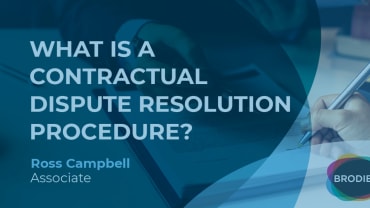Eligible small and medium-sized enterprises (SMEs) now have access to a new dispute resolution service called the Business Banking Resolution Service (BBRS). The BBRS launched on 15 February 2021. It is designed to provide a free, accessible and independent service to SMEs that have complained to their bank about an "incident" relating to a banking product or service taken out with that bank.
It is envisioned that both SMEs and participating banks will benefit from the new service. The BBRS positions itself as a cheaper and faster alternative to court action. The service incorporates several methods of dispute resolution - including settlement negotiation, mediation and adjudication - to help SMEs and banks achieve a fair and reasonable conclusion to their disputes. The scheme rules require the parties to keep proceedings confidential.
The BBRS is voluntary for SMEs to use. The SME and the bank agree by contract to submit their dispute to the BBRS. When the BBRS makes a determination in a case, the SME can choose whether to accept or reject that determination. If the SME accepts the determination, it becomes binding on the SME and the bank. If the SME rejects the determination, neither party is bound by its terms. The SME may thereafter bring other forms of action against the bank, should it wish to.
In its determinations, the BBRS is empowered to make awards for financial and non-financial loss. The maximum award the BBRS can make against a bank is for payment to the successful complainant of £600,000. The determination of the BBRS can, in certain circumstances, be appealed to the 'Chief Adjudicator', whereupon, if it appears to the Chief Adjudicator that the appeal should proceed, they will convene an 'Appeal Panel' to hear the appeal.
It should be noted that the BBRS is only available where the complaint was raised against a participating bank. At present, most major UK banks participate in the scheme and more banks are expected to join in the future.
Requirements to be met when applying to the BBRS
There are several requirements to be met before an SME can bring a complaint to the BBRS:
- The SME must have made the complaint to the bank direct, prior to applying to the BBRS.
- The complaint must relate to a 'banking service', which is defined broadly as a 'lending or payment service'.
- The complaint must not be of a type which ought to be raised with the Financial Ombudsman Service. This way the BBRS complements, rather than overlaps with, the jurisdiction of the Financial Ombudsman Service.
The SME must also be 'eligible' by reference to financial criteria. There are separate criteria for businesses, charities and trusts. The financial criteria that apply to any particular complaint are fixed by the scheme to which the complaint relates. Presently, there are two schemes of complaints: the 'Contemporary Scheme' and the 'Historical Scheme'. The Contemporary Scheme deals with complaints relating to an incident which took place on or after 1 April 2019. The Historical Scheme deals with complaints relating to an incident which took place before 1 April 2019 but after 30 November 2001.
The financial thresholds for complaints falling within the Contemporary Scheme can be found here, while the those for the Historical Scheme can be found here.
Another option for resolving disputes out of court
The BBRS adds another option to the suite of approaches which customers can take to resolving disputes with their bank to avoid litigating in court. The new service is likely to be popular: the not-for-profit organisation behind the BBRS anticipates that 5,000-6,000 complaints will be brought over a three-year period under the Historical Scheme alone.
Yet, as with any new service, there are likely to be some early teething issues and wrinkles to iron out for which professional guidance may prove useful from the perspective of both SMEs and banks. SMEs, in particular, should consider their options carefully and seek early professional legal advice to help them decide which dispute resolution forum best suits their needs.
Contributor
Trainee Solicitor












